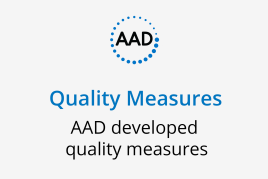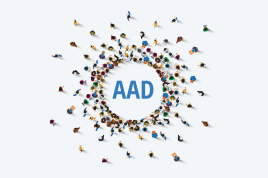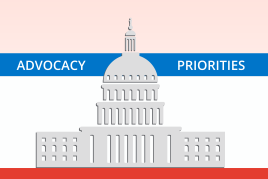Advocacy Update Feb. 4, 2025

IN THIS ISSUE / Feb. 4, 2025
Physician champions introduce Medicare physician payment fix in House
Academy joins coalition urging less regulatory burdens in Medicare Advantage and Part D program
Medicare Payment
Physician champions introduce Medicare physician payment fix in House
On Jan. 31, physician champions in the U.S. House of Representatives introduced a bipartisan bill to address the 2025 Medicare Physician Fee Schedule cut that went into effect on Jan. 1, 2025, and provide for an inflationary update. The AADA supports this bill and encourages members to contact Congress to move it forward.
H.R. 879, the Medicare Patient Access and Practice Stabilization Act of 2025, would prospectively stop the 2.83% cut to Medicare payment that went into effect on Jan. 1, 2025 (between April 1-Dec. 31, 2025) and provide physicians with an additional 2% Medicare Economic Index payment increase for physician practices.
The AADA strongly supports this bill that was introduced by Reps. Greg Murphy, MD (R-NC), John Joyce, MD, FAAD (R-PA), Ami Bera, MD (D-CA), Raja Krishnamoorthi (D-IL), Carol Miller (R-WV), Jimmy Panetta, (D-CA), Mariannette Miller-Meeks, MD (R-IA), Raul Ruiz, MD (D-CA), Claudia Tenney (R-NY), and Kim Schrier, MD (D-WA).
Reduce Regulatory Burdens
Academy joins coalition urging less regulatory burdens in Medicare Advantage and Part D program
The Regulatory Relief Coalition (RRC), of which the AADA is a member, asked CMS to reduce regulatory burdens in the proposed 2026 Medicare Advantage Part D program.
Among the recommendations outlined in the letter, the RRC asked CMS to consider establishing a mechanism for physicians to report violations of the established standards. The RRC letter (PDF) echoed previous AADA comments and urged CMS to reduce burdens with prior authorization and to ensure accessible, transparent directories.
Quality Payment Program
AADA urges CMS to improve MVP framework
The AADA joined 30 other medical organizations urging CMS to revise its MIPS Value Pathways (MVP) framework (PDF). The letter recommended grouping measures in a way that better reflects chronic health conditions, episodes of care, and major procedures, rather than the broad, ineffective structure currently in place.
Since the inception of MVPs, the AADA and other specialty societies have actively engaged with CMS to provide constructive feedback on improving the program. However, CMS has yet to implement meaningful changes or provide transparency in the MVP development process. In our letter, we called for key reforms to ensure that MVPs are clinically relevant, reduce burdens on physicians, and provide meaningful comparisons for patients.
AADA News
Become an AADA Advocacy Key Contact
Are you looking to bring your advocacy efforts to the next level? Consider becoming an AADA Advocacy Key Contact.
AADA Advocacy Key Contacts are grassroots advocates who foster relationships with their lawmakers and help to tell the story of how health care policies impact patients and physicians every day. Advocacy Key Contacts receive resources and support from AADA staff. They are a trusted resource to their elected officials on policy issues affecting dermatologists and the specialty.
Learn more about the the Key Contact program and to how sign up. Already have a relationship with your member of Congress that you’d like to develop further? Contact AADA staff at grassroots@aad.org.
AADA News
Support dermatology champions in Congress through SkinPAC
As of Jan. 30, SkinPAC has raised $48,944 from 43 individuals. SkinPAC helps strengthen our relationships on Capitol Hill and reinforces our grassroots and lobbying efforts. Donate today.
Contribute online at www.skinpac.org or by texting SkinPAC to 71777. Email skinpac@aad.org with any questions.
The political purpose of the American Academy of Dermatology Association Political Action Committee ("SkinPAC") is to solicit and receive contributions to be used to make political campaign expenditures to those candidates for elective office, and other federal political committees, who demonstrate understanding and interest in the view and goals of the American Academy of Dermatology Association.
Contributions to SkinPAC are not deductible for federal income tax purposes. Contributions to SkinPAC must be made from your funds and may not be reimbursed. SkinPAC cannot accept contributions from corporate accounts. Any recommended contribution amount is merely a suggestion. All AADA members have the right to contribute more or less or refuse to contribute without reprisal. Federal law prohibits us from accepting contributions from foreign nationals. Federal law requires us to use our best efforts to collect and report the name, physical address, occupation, and name of the employer whose contributions exceed $200 in a calendar year.
 Find a Dermatologist
Find a Dermatologist
 Member directory
Member directory
 AAD Learning Center
AAD Learning Center
 2025 AAD Innovation Academy
2025 AAD Innovation Academy
 Need coding help?
Need coding help?
 Reduce burdens
Reduce burdens
 Clinical guidelines
Clinical guidelines
 Why use AAD measures?
Why use AAD measures?
 Latest news
Latest news
 New insights
New insights
 Physician wellness
Physician wellness
 Joining or selling a practice?
Joining or selling a practice?
 Promote the specialty
Promote the specialty
 Advocacy priorities
Advocacy priorities
